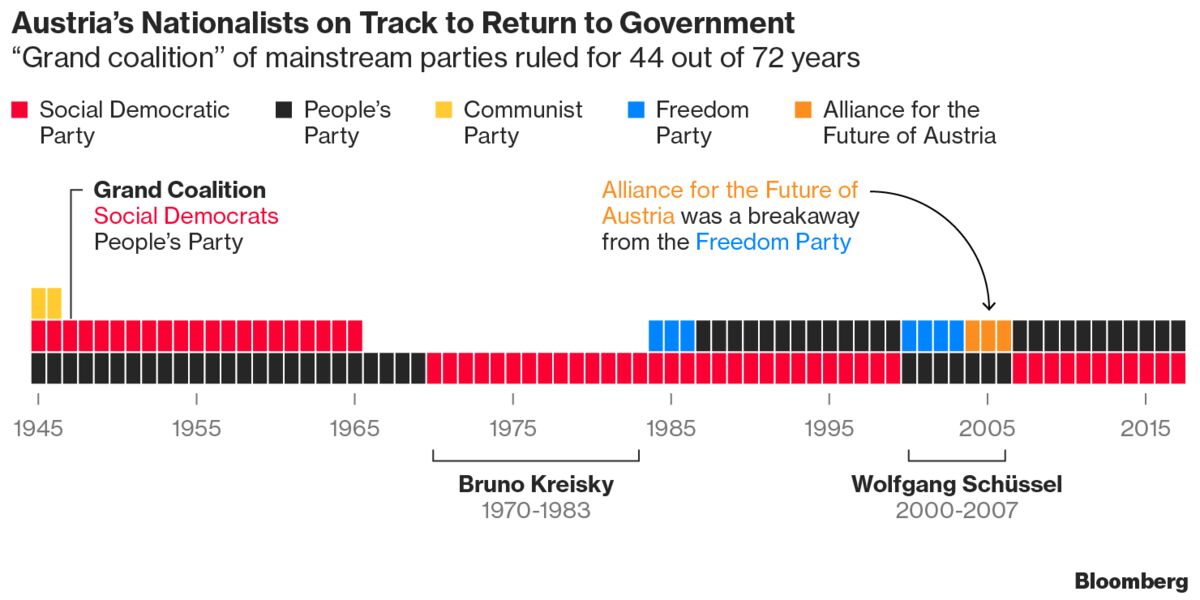
Europe’s nationalists are about to get another boost when Austrians vote in an election this weekend that’s likely to give the euro-critical Freedom Party a share of power.
Three weeks after voters lifted a far-right opposition party into parliament in Germany, its smaller neighbor is poised to go further and potentially pave the way for a government with the Freedom Party as junior partner. Though the euro’s economic benefits make radical policy shifts unlikely, such an outcome would leave German Chancellor Angela Merkel facing a more prickly ally to the south as she seeks to keep the EU united.
After populist candidates fell short in several European elections this year, Austria is a reminder that establishment politics remains under siege. Foreign Minister Sebastian Kurz, 31, is the front-runner in Sunday’s election and would become the world’s youngest head of government if elected chancellor. In the campaign, he shifted his People’s Party toward the hard-line anti-immigration stance pushed by Freedom leader Heinz-Christian Strache, 48.
“The Freedom Party is drooling over getting into government again,” said Thomas Hofer, a political consultant based in Vienna. “Strache has been the opposition leader for 12 years, and at some point he really wants to be addressed as ‘Mr.’ That’s his clear intention.”
As Catalonia’s campaign for independence reignites political risk in the EU, Austria may prove a stabilizing force if Kurz manages to defang the far right.
Since taking over as People’s Party head in May, he has pulled ahead in the race by presenting himself as a fresh, socially conservative candidate who’s committed to the EU. Kurz and Chancellor Christian Kern, whose Social Democrats are polling third, face off in a televised debate Wednesday night.
While Kurz and Freedom’s Strache may shake up Austria’s cozy political order, they’re mostly aligned in pledging business-friendly policies, notably to scrap corporate taxes on retained profits. They’ll also stay in the German-led camp favoring fiscal austerity in the euro area.
“The EU is so important for Austrian business, and both parties are so close to Austrian business, especially large companies, that I don’t see how this could turn into an anti-EU government,” said Stefan Bruckbauer, chief economist of UniCredit Bank Austria.
Why Austria May Elect the World’s Youngest Leader: QuickTake Q&A
Strache, whose party’s last stint in government under Joerg Haider led to EU diplomatic sanctions against Austria, sought to ease the way to power by backing off strident rhetoric against the EU. It’s a contrast with his call in 2010 to “kick the entire Mediterranean region out of the euro zone.”
While criticizing EU institutions for alleged overreach, “we’re pro-Europe,” Strache said during a debate with Kurz on Sunday. That eliminates the biggest obstacle to teaming up with Kurz, who said he won’t ally with any party that flirts with leaving the EU.
Where Merkel and French President Emmanuel Macron may face increased resistance is on proposals to deepen European integration, maintaining economic sanctions on Russia and chastising eastern EU member countries seen as crimping democratic freedoms.
Moscow Trip
After Strache traveled to Moscow in December to sign a cooperation accord with President Vladimir Putin’s United Russia party, the Freedom Party said it wants to roll back EU sanctions because they’re “harmful and ultimately useless for the economy.”
To resist “centralistic ideas driven by Merkel and Macron,” Strache expressed kinship with eastern countries including Poland and Hungary, which balked at accepting refugees and are at odds with EU authorities over civic freedoms and the separation of powers.
Like the anti-Merkel Alternative for Germany party, Strache’s bid for power in his country of 8.8 million was energized by the refugee crisis in 2015 and a history of government by two big parties, which have run Austria together for 44 of the 72 years since World War II.
The Freedom Party already came close last year when its candidate narrowly lost Austria’s presidential election and both major parties slumped.
“The constant bickering between the two main parties was an ideal environment for Strache,” said Hofer, the political consultant. “Freedom’s biggest strength was the weakness of the others.”
‘Simple’ Answers
Support for the People’s Party declined 1 percentage point to 33 percent and the Freedom Party was steady at 27 percent in a Research Affairs poll for Oesterreich newspaper published Tuesday. The Social Democrats, dogged by a haphazard campaign, polled 23 percent. 6-8 poll of 1,000 people has a margin of error of 3.
Founded after World War II by a former SS officer, the Freedom Party entered government for the first time in 2000 when a People’s Party chancellor allied with Haider, whose flirting with the Nazi past provoked a backlash from other EU governments.
After the party split in 2005 and Haider died in a car crash three years later, Strache picked up the pieces. Polls suggest he could now beat Haider’s 1999 record of 26.9 percent of the vote, though defeating the People’s Party’s Kurz would be an upset.
“Sebastian Kurz’s genius has been to offer clear -- if rather simple -- answers,” Erik Nielsen, chief economist at UniCredit, said in a note. “While Kurz’s immigration policies may run counter to the thinking in Berlin and Paris, there is probably relief (and appreciation) that he curtailed the Freedom Party.”
— With assistance by Jonathan Tirone, Matthias Wabl, and Samuel Dodge.


0 comments:
Post a Comment